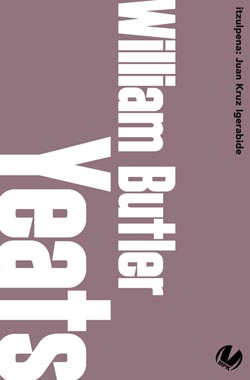
Aurkibidea
Innisfreeko aintzirako uhartea
Arrosa gorria denboraren gurutze gainean
Maitalea bere bihotzeko arrosaz mintzo
Oihanaren deiadarra entzuten du hark
Zeruko konstelazioen parte zeneko iragan-handitasuna gogoan
Gizakiek hobera egiten dute adinean aurrera joan ahala
Irlandar hegazkinlari batek bere heriotza iragartzen du
Hanrahan Gorria Irlandari kantari
Thoor Ballylee-ko harri batean grabatzeko
Kristau-maitasuna gutxi iruditzen Ribh-i
Aurkibidea
Innisfreeko aintzirako uhartea
Arrosa gorria denboraren gurutze gainean
Maitalea bere bihotzeko arrosaz mintzo
Oihanaren deiadarra entzuten du hark
Zeruko konstelazioen parte zeneko iragan-handitasuna gogoan
Gizakiek hobera egiten dute adinean aurrera joan ahala
Irlandar hegazkinlari batek bere heriotza iragartzen du
Hanrahan Gorria Irlandari kantari
Thoor Ballylee-ko harri batean grabatzeko
Kristau-maitasuna gutxi iruditzen Ribh-i
Odola eta ilargia
I
Bedeinkatua bedi toki hau,
are bedeinkatuagoa dorre hau,
arraza honetatik altxatu baitzen
odola, ahalmen harroa,
bertan mintzatuz eta nagusituz,
ekaitzak jotako etxola horren
hormak bezala altxaturik.
Ikur ahaltsu bat eraiki dut erdeinuz
eta errimaz errima kantatu dut
gailurrean erdi-hilik dagoen
garai bati iseka eginez.
II
Alexandria baliza-dorre zen,
eta Babilonia, zeruen mugimenduaren irudia,
eguzkiaren eta ilargiaren
bidaiaren erregistro-liburua;
eta Shelleyk ere bazituen bere dorreak,
gogoetaren ahalmen koroatuak
deitu zienak behin.
Nik, berriz, diot dorre hau
dela nire sinboloa;
nik diot eskailera sigi-sagatsu,
birakari eta espiralez osatua
dela nire zurubi antzinakoa;
Goldsmith, deana, Berkeley eta Burke
han zehar igarotakoak dira.
Deana, Swift, bularra kolpatuz
misteriozko eldarnio itsu batez,
ezen bihotzak bular odoleztatutik
gizateriarengana bultzatu zuen;
Goldsmith, bere gogamenaren
ezti-ontzitik xurgaka,
eta Burke harroetan harroa
Estatuari zuhaitz bat erakutsiz,
txorien labirinto menderaezina,
mendez mende hostoak botatzen dituena
heriotzan etzanik matematikoki berdinduz,
eta Berkeley Jainkoak hautatua,
gauza guztiak amets gisa erakutsi zituena,
nahiz eta mundu zerri, pragmatiko, zentzugabe
honen erditzeak hain sendoa dirudien,
ezen desagertu egingo baita
gogamenak gaia aldatu ahala;
Saeva Indignatio eta gure odola,
desiraren arima-handitasuna;
Jainkoa ez den oro su intelektualak suntsitua.
III
Hodeirik gabeko ilargiaren garbitasunak
zorua geziz josi du,
zazpi mende igarota, hala ere garbi,
errugabetasunaren odolak ez du orbanik utzi.
Han, odolez blaituriko lurrean tentesoldadua, hiltzailea, borreroa.
Dela eguneroko zoritxarragatik,
edo erabateko gorrotoagatik, edo odol-isurketagatik,
ezin izan zuen inolako turrustarik
bota horren guztiaren gainera.
Odolaren usaina antzinako zurubian!
Gu, odolik isuri ez dugunok,
elkartu gaitezen hantxe
eta egin dezagun deiadar eldarnioz
mozkorturik ilargiaren alde.
IV
Hautsez beteriko leiho distiratsuetan itsasten dira,
ilargiak argituriko zeruan itsatsiko balira bezala,
asun-tximeletak,
pauma-tximeletak;
horra gau-sits batzuk hegan.
Nazio moderno bakoitza
dorrearen antzeko ote da?
Hor, erdi hilik, muinoan? Ez dio axola zer esan dudan,
heriotza da-eta jakinduriaren jabe,
bizitzarekin bateraezina; eta bizitza, berriz,
indarraren jabe, odolaren
orbana duen beste edozer bezala;
baina inolako orbanik ezin da igo
ilargiaren aurpegira, hodei batetik
loriaren loriaz begiratzen zaionean.
Blood and the Moon
I
Blessed be this place, / More blessed still this tower, / A bloody, arrogant power / Rose out of the race / Uttering, mastering it, / Rose like these walls from these / Storm-beaten cottages — / In mockery I have set / A powerful emblem up, / And sing it rhyme upon rhyme / In mockery of a time / Half dead at the top.
II
Alexandria’s was a beacon tower, and Babylon’s / An image of the moving heavens, a log-book of the sun’s journey and the moon’s; / And Shelley had his towers, thought’s crowned powers he called them once. // I declare this tower is my symbol; I declare / This winding, gyring, spiring treadmill of a stair is my ancestral stair; / That Goldsmith and the Dean, Berkeley and Burke have travelled there. // Swift beating on his breast in sibylline frenzy blind / Because the heart in his blood-sodden breast had dragged him down into mankind, / Goldsmith deliberately sipping at the honey-pot of his mind, // And haughtier-headed Burke that proved the State a tree, / That this unconquerable labyrinth of the birds, century after century, / Cast but dead leaves to mathematical equality; // And God-appointed Berkeley that proved all things a dream, / That this pragmatical, preposterous pig of a world, its farrow that so solid seem, / Must vanish on the instant if the mind but change its theme; // Saeva Indignatio and the labourer’s hire, / The strength that gives our blood and state magnanimity of its own desire; / Everything that is not God consumed with intellectual fire.
III
The purity of the unclouded moon / Has flung its arrowy shaft upon the floor. / Seven centuries have passed and it is pure, / The blood of innocence has left no stain. / There, on blood-saturated ground, have stood / Soldier, assassin, executioner, / Whether for daily pittance or in blind fear / Or out of abstract hatred, and shed blood, / But could not cast a single jet thereon. / Odour of blood on the ancestral stair! / And we that have shed none must gather there / And clamour in drunken frenzy for the moon.
IV
Upon the dusty, glittering windows cling, / And seem to cling upon the moonlit skies, / Tortoiseshell butterflies, peacock butterflies, / A couple of night-moths are on the wing. / Is every modem nation like the tower, / Half dead at the top? No matter what I said, / For wisdom is the property of the dead, / A something incompatible with life; and power, / Like everything that has the stain of blood, / A property of the living; but no stain / Can come upon the visage of the moon / When it has looked in glory from a cloud.